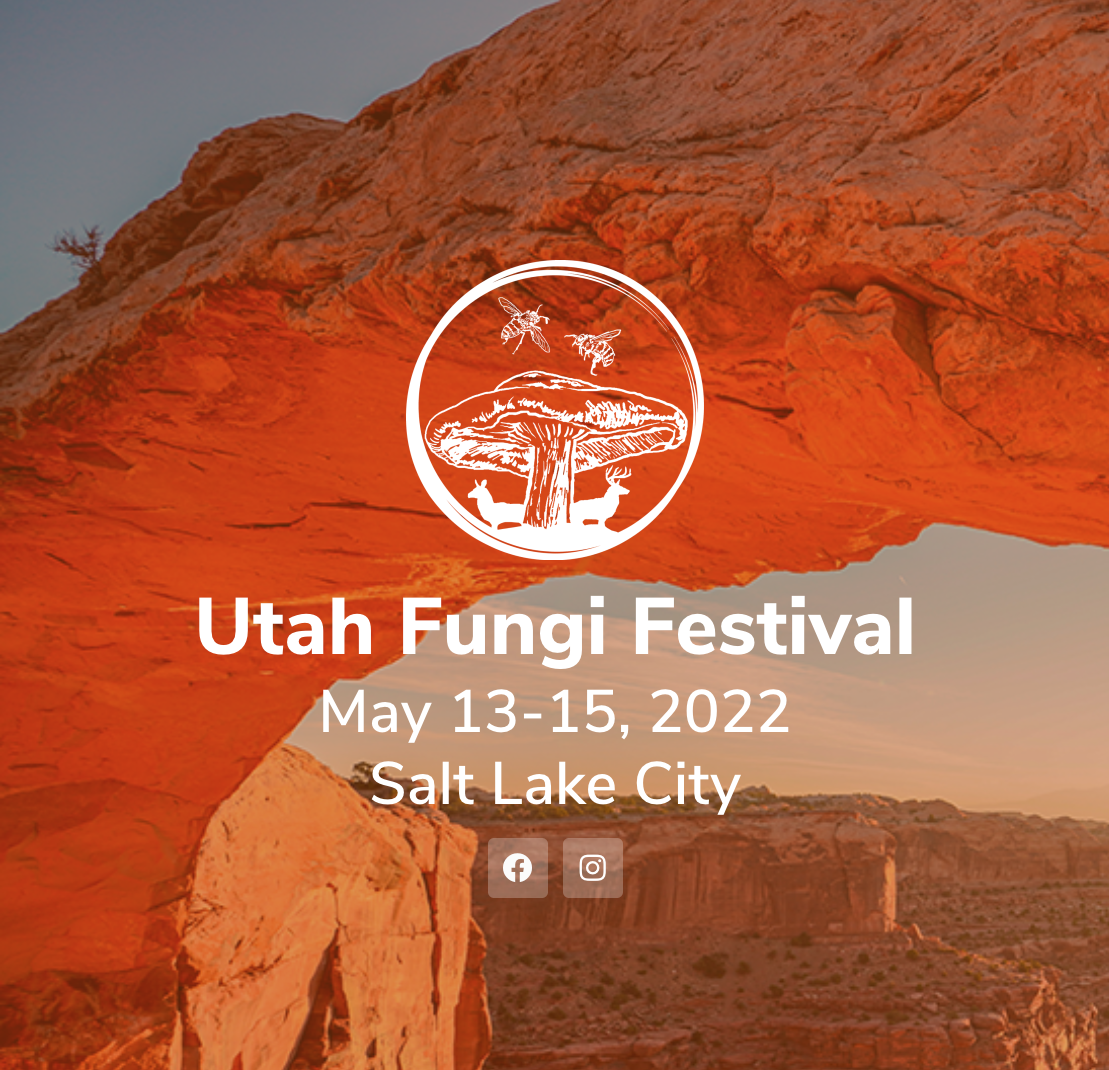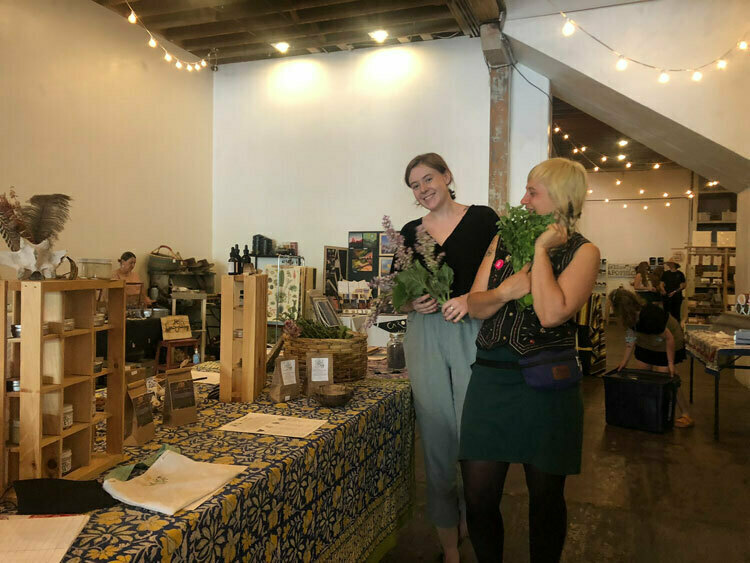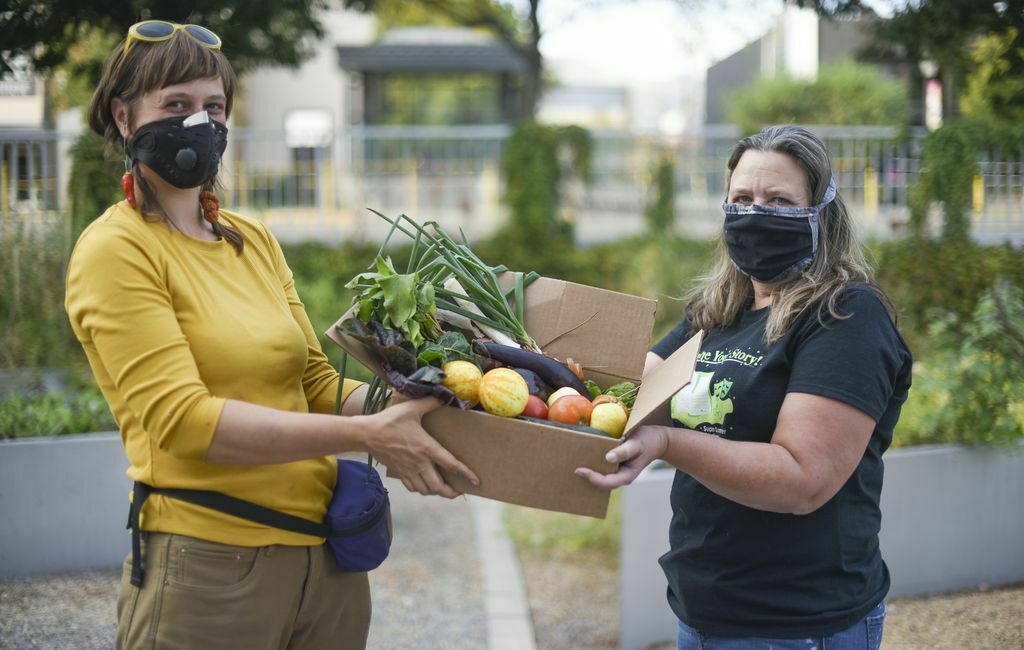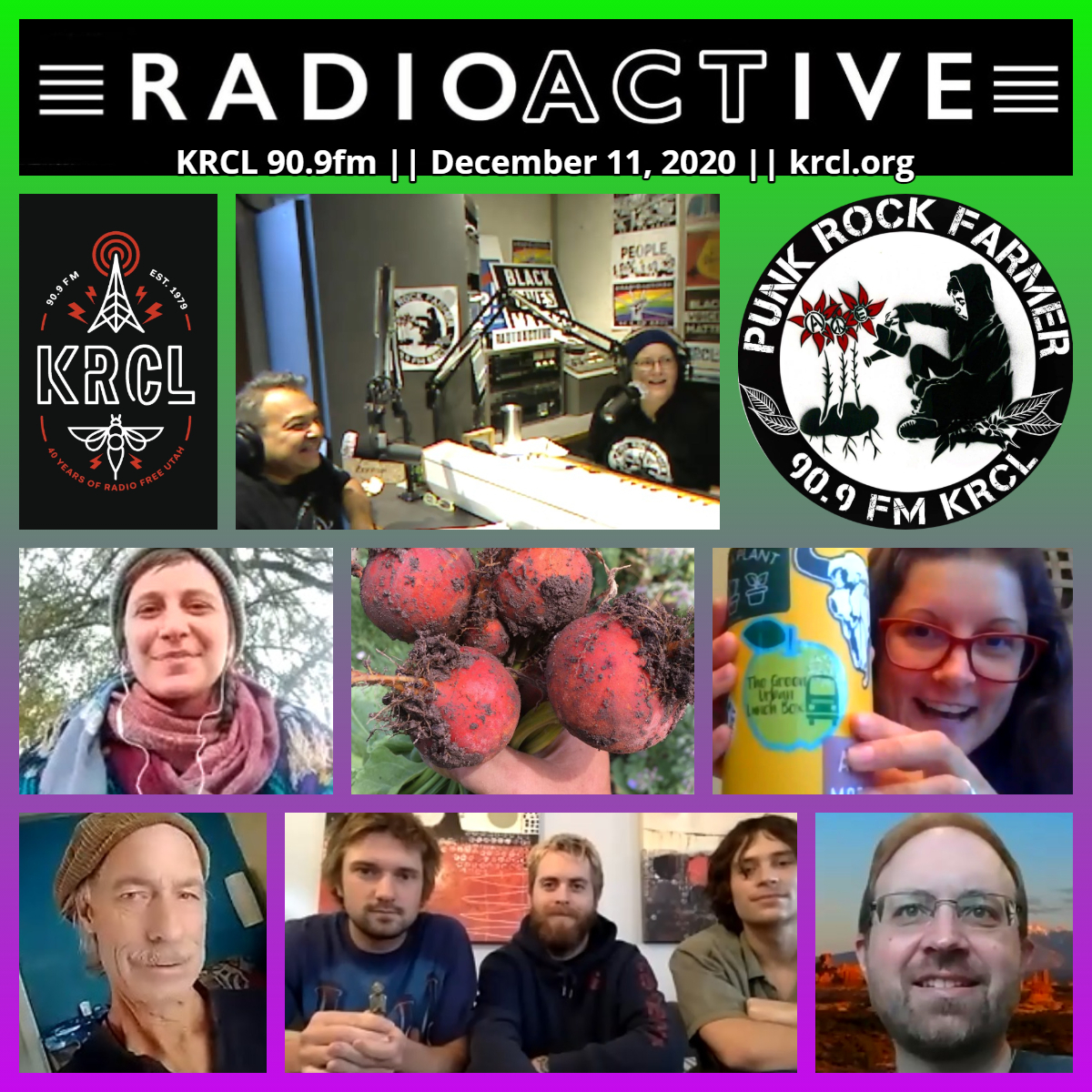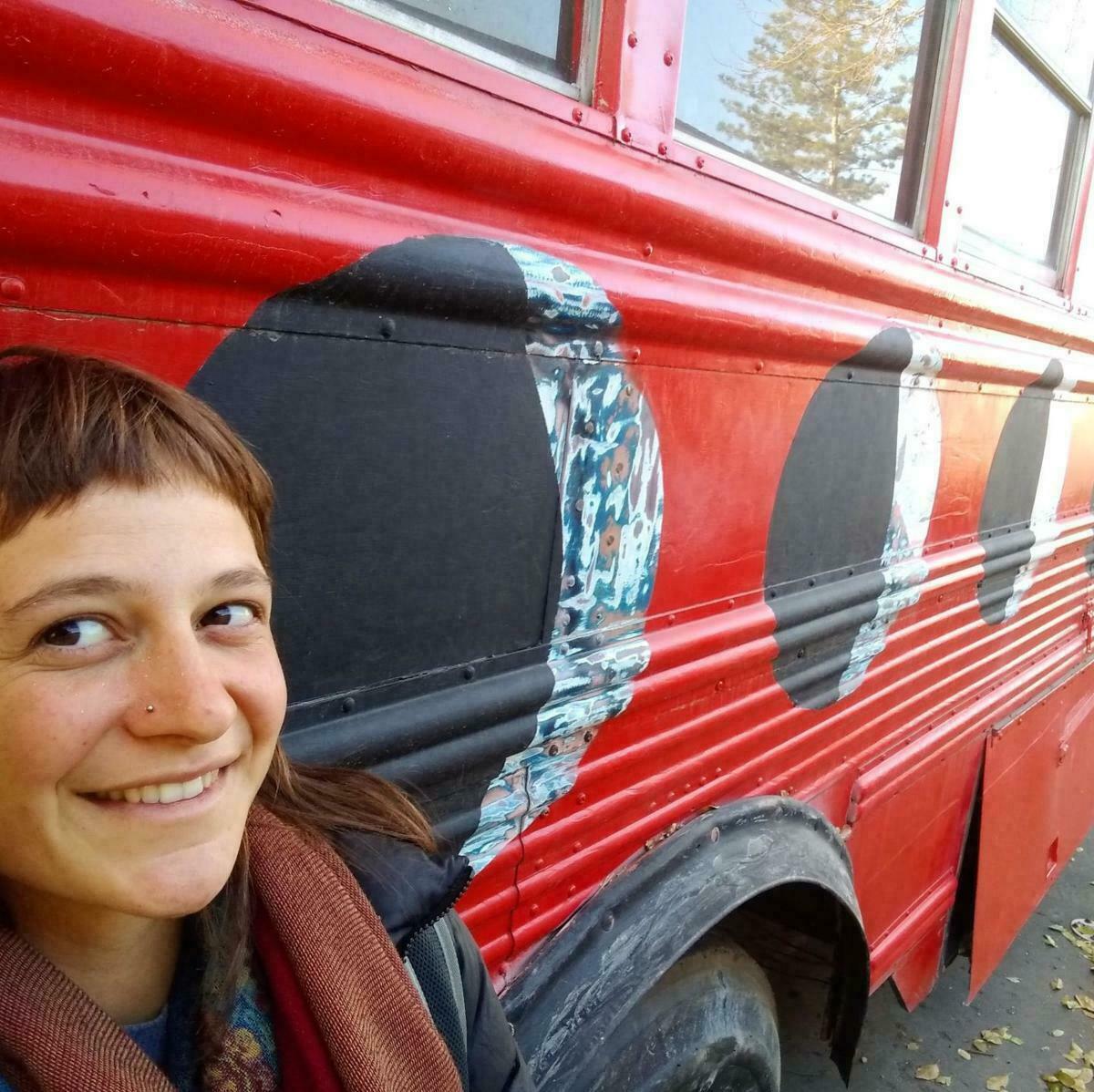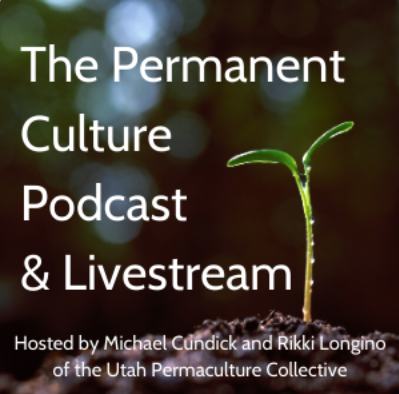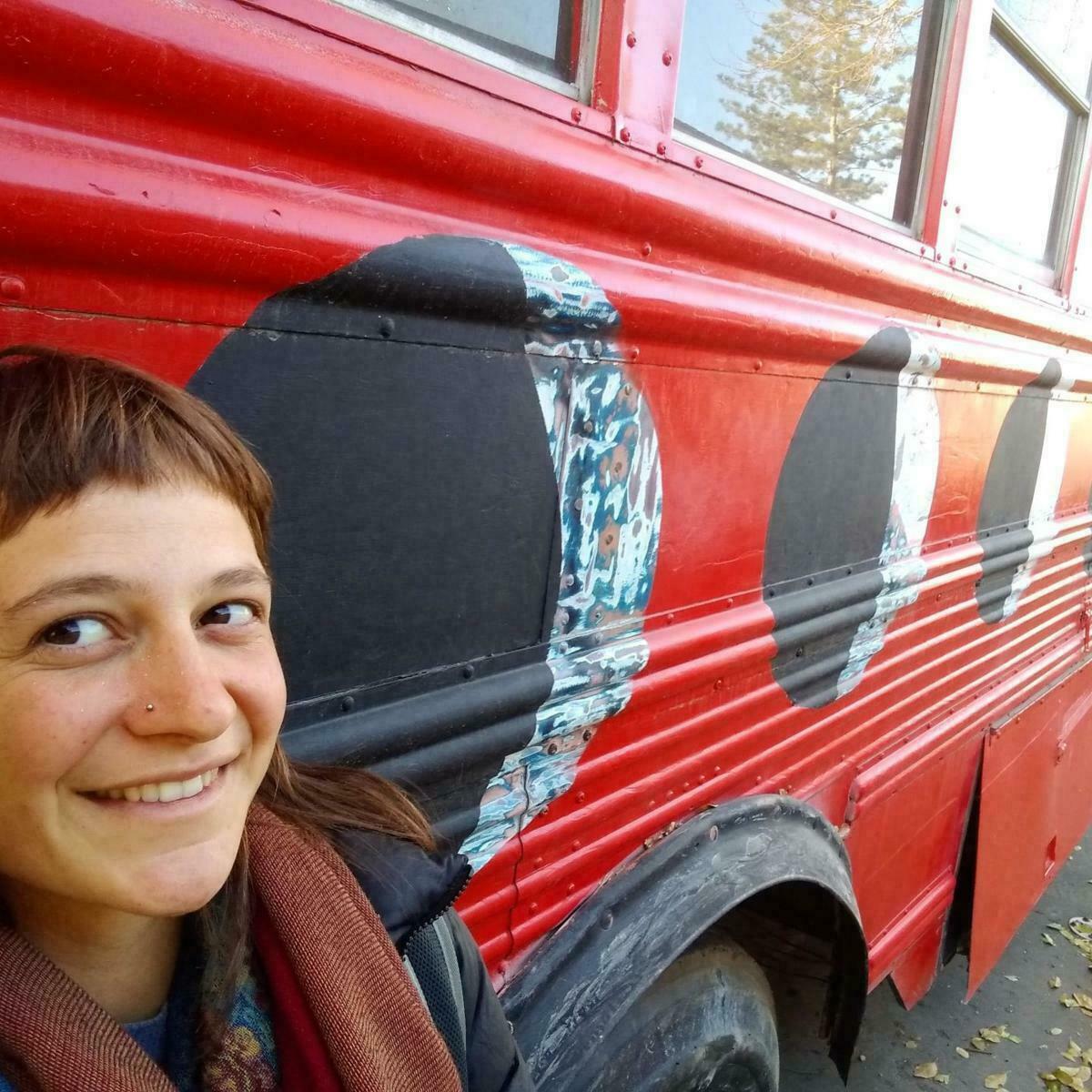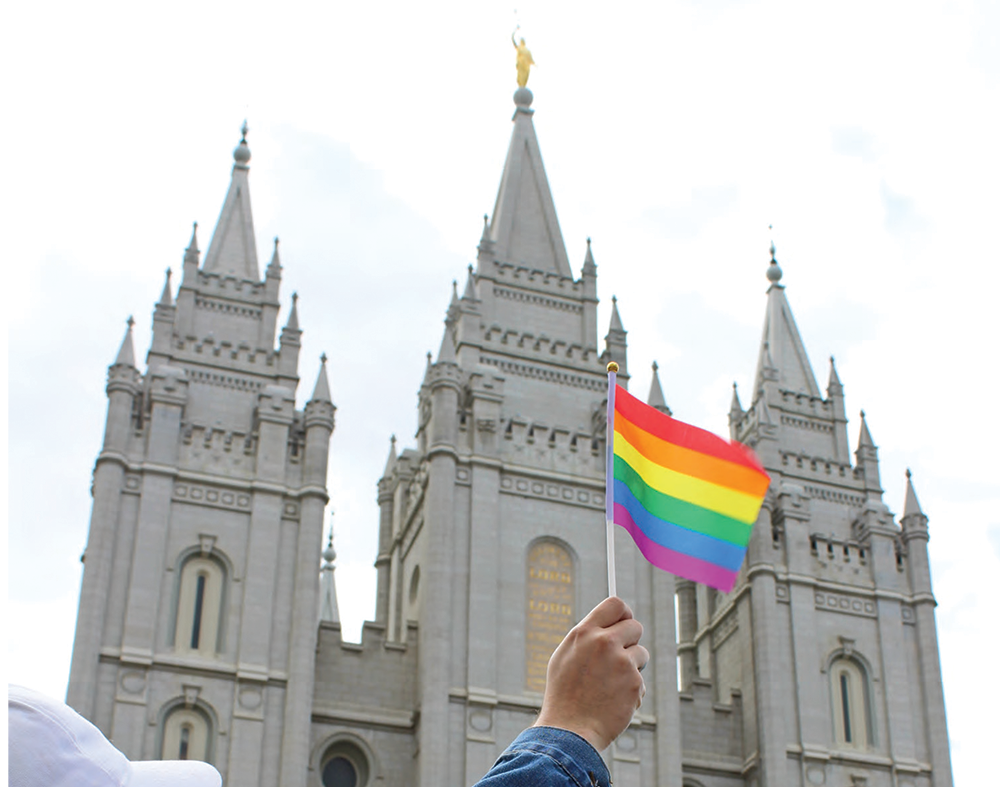LOG
TOPIC -- WOMEN IN MYCOLOGY WITH JME BONFIGLIO + MEDICINAL MUSHROOM TEA LOUNGE WITH TAROT READINGS
Rikki Longino is a Salt Lake-based community organizer, ecological gardener, and overall fungi. Rikki founded the Mobile Moon Co-Op, a female and queer botanical collective, tea shop, and farm and has worked at various local organizations for the advancement of resilient and equitable food. Rikki’s passion for fungi has brought them to the Radical Mycology Conference, The Midwest Women’s Herbal Conference: Mycelium Mysteries, Mycosymbiotics, and The New Moon Mycology Summit.
By Brooke Larsen
Riley Sayers is a second year student in the Environmental Humanities Program and a Mellon Community Fellow. In 2020, the EH Program received a three-year grant from the Andrew W. Mellon Foundation to support community engaged research. Our Mellon Community Fellows develop projects with a community partner that furthers environmental justice. Riley’s community partner is the Mobile Moon Co-op, a female and queer collective that strives to aid communities and ecosystems through education, empowerment, and botanical stewardship. Riley also organizes with the Salt Lake Community Bail Fund and Decarcerate Utah. In June, I talked with Riley about their work in the Salt Lake community, past organizing experiences, and their vision for a better future.
Brooke: What are you currently working on in the community?
Riley: I work at the Mobile Moon Co-op as a core member. My roles are administrative ecologist and the product planner for our herbal CSA. I'm also a writer for our zines and grant applications. Right now, we're in a stage of growth with a lot of grant money coming in, including from Environmental Humanities, so there's a lot to do to build infrastructure. I've been building up organizational systems that will hopefully contribute to our sustainability. I also do a lot with Moonboxes, which are monthly boxes of herbal products we curate, and I'm starting to make herbal products.
I’m also an organizer with the Salt Lake Community Bail Fund, which is a committee of Decarcerate Utah. One of my main roles is to actually go to the jail and post bail. So one to three times a week, I'll go to the bank and get cash and then go to the jail. We’re also doing grant research to find out where we can get funding for a lot of the very high bails, which can range from $25k to $500k. We’re also working on policy research--specifically strategies for communicating with the public about abolition and the harms of the cash bail system. For example, there's revenue coming into the county treasury from bail money that doesn't actually get returned to families, individuals, nor the community as a whole. We're newly finding out that to get bail money back, you have to go through huge processes. I do other work with Decarcerate Utah as well. I am on the Building and Caring committee, and much of my work with DU has to do with our mutual aid efforts.
Brooke: How do you see the work you do with the Mobile Moon Co-op and Decarcerate Utah being aligned? What is the larger vision you’re working towards?
Riley: So the bail fund is very much focused on treating the symptoms of a harmful system and working towards dismantling these systems through educating the public and advocating for those who are most impacted by the systemic racism that is the criminal justice system. This work is very focused in the moment: Who can we afford to bail out? How can we support these individuals? The Mobile Moon Co-op centers on imagining the possibility of a better world and collectively learning how to build community in ways that are meaningful and that make abolition possible. Abolition can happen when we make prisons themselves obsolete. Infrastructure for community care and stewardship that centers the needs and voices of women, queer, trans, and BIPOC folks is a huge part of the Mobile Moon Co-op. These organizations support each other in this network. Each month, Mobile Moon donates 30% of all proceeds to a solidarity partner. The June solidarity partner was the Salt Lake Community Bail Fund. Supporting other organizations helps expand what the Mobile Moon stands for, which is that post-apocalyptic, post-capitalist dream of equitable ecologies.
Brooke: You came to Salt Lake in August 2020. Before that you were involved in organizing and activism in Columbus, Ohio. How do those experiences inform what you’re currently doing in Salt Lake?
Riley: In Columbus, and before the summer of 2020, I was mostly doing refugee and immigrant community care organizing, such as youth mentorship. I was also working on ecological urban gardening and food sovereignty projects. For the last year and a half of my undergrad, I worked at the OSU student farm, which was a five acre plot on the edge of the university’s research farm that's just north of the city. We did organic farming, and we did a lot of ecological experimentation. I loved it. I have no science background whatsoever, but I found that working within a living laboratory made space for knowing the place and their needs more holistically. During COVID, we had to go through a lot of applications and bureaucracy to get back to work so that we could do CSAs that were free for students. We were able to return to operations, and all of our harvest went straight to free CSAs for students and families in the area.
At the beginning of last summer, I shifted to organizing for protest protection and community security commons. My undergraduate degree was in security intelligence, and I put that into practice for the people and against the institutions that claim ownership over these types of systems. The people of Columbus came together within a week to develop infrastructures to protect, provide medical attention, and care for protestors and activists, and these systems have grown and continue to hold the community today. Community security commons encompass everything from first responders such as street medics, white allies, and videographers to remote support for counter-surveillance and legal aid. I'm most interested in militancy. Militancy can look like protecting protesters with bikes, and it can also look like gardening somewhere that's private property and harvesting spinach out of the parking lot; to me, this is critical resistance that we cannot go without.
When I came to Salt Lake, I knew no matter what I would be doing, I wanted to contribute to local abolition work with a group like the Salt Lake Community Bail Fund and Decarcerate Utah. But I didn't want to lose the food and plant medicine production that I had already found as therapeutic and peaceful while working on farms and gardens in Columbus. I talked with Mobile Moon folks and went to a few meetings and work days, and it was very explicit that the militant, radical ideas that I've wanted to pursue are at Mobile Moon. I saw the most opportunity in Mobile Moon for putting money straight into the community through strategic means. So through the first Environmental Humanities Community Partner Grant that was disbursed in tandem with my fellowship, we now have a stipend for all solidarity partners that's $300 a month--this is in addition to 30% of all proceeds. Then money is also going to compensate the core members, educators, and allowing space for folks to enact their own projects and ideas with funding. Our partnerships are thriving, and our roots in the community continue to grow. One of those partnerships includes Black Lives Matter SLC. Ashley Finley, a co-founder of BLM SLC, is growing a garden at the Moonstead. Some of the money from the grant has gone to starters and other needs so that she can distribute produce bags to Black community members.
Brooke: You plan to focus your thesis on militant ecologies. What does militant ecologies mean to you?
Riley: I say that militant ecologies--which are interrelationships between all human, non-human, more than human, soil, everything--are intentionally or inherently combative, destructive, and dismantling on the grounds of transformation and restoration. With militancy, I say that it includes physical acts of resistance and restructuring and building new things. Militancy includes and necessitates violence. I live out of the example of fungi for everything. For example, white rots have been capable of eradicating and repurposing toxics of extraction capitalism since before these toxics became abundant and oppressive. Mycology is militant; we're just not applying it. Militancy can look like strategic inoculations to clean up poisons and waste that corporations and the government purposefully place in Indigenous, Black, POC, and working-class communities.
For my thesis, I’m going to be compiling a collection of essays on militant ecologies. One of these essays, for example, will center revolutionary bike cavalries in urban spaces. Bikes are tools--for sustainable transportation, physical health, community, and sometimes holding the line between riot gear-adorned police advancing on protestors with deadly and disabling forces. Bikes’ mycelium in cities are especially on my mind, and I’m hoping to expand my work with community members and my knowledge on relevant mechanics to continue to make this sect of “recreation” accessible to all. I want to deconstruct the exclusion of militancy in environmental justice and abolition movements as we continue to lose lives and places to capitalism and white supremacy.
By Sara Tabin
It’s still the middle of winter, but now is the ideal time to start planning your garden.
And if you don’t have the space in your own backyard (or don’t have a yard at all), the downtown Salt Lake City Public Library has four open community garden plots that will be assigned through a raffle that closes on Feb. 1.
Rikki Longino, the library’s garden coordinator, said there are 18 total 8-by-4 plots in the community garden, but only four are currently open. Longino said the garden was closed last year because of the pandemic, and people who had been granted plots last year were rolled over to this year.
While the garden was closed, library employees grew crops in the plots to donate to the Women’s Resource Center.
Longino, who uses they/them pronouns, said this year’s new gardeners will be selected in February after the lottery closes. Members of the public won’t be able to wander through the gardens this year because of the pandemic, but people who are assigned plots will be able to work at their gardens as long as they social distance and wear masks.
People over 18 years old who live between North Temple and 900 South and between 600 West and 700 East are eligible for a free plot and can enter the library’s online raffle at SLCPL.org.
In addition to lending out books, the library also runs a “seed library” that is free for everyone, not just people with a community garden plot. Longino said the library encourages people to donate their seeds back to the library at the end of the growing season. Those seeds are then distributed for free to other gardeners. In the past, people could come check out the seeds in person. This year, people will be able to browse the seed collection online and place an order with the library.
“It’s all free and you don’t even need a library card,” they said.
Longino said the garden, which opened in 2016, fits well at the library because it is also a community center where people can hang out and use computers. The library is also using the garden to educate the public about how food is grown. The library has made videos about topics like planting garlic and growing herbs for tea and broth that are on the library’s Instagram (@slcpl) and Facebook.
Winners of the raffle will be notified on or before Feb. 16, according to the library’s website, and will be required to attend an orientation session in March.
Don’t panic if your bid for a library plot doesn’t pan out. Salt Lake City residents can also apply for community garden plots in multiple locations around the city through Wasatch Community Gardens. Fees for plots at Wasatch’s gardens range from $25 to $37.
Wasatch Associate Director Andrea Melliadis said the application is open all year on a first-come, first-serve basis. She said Wasatch Community Gardens tries to place everybody, but it depends on which garden a person applies to since different gardens generate different levels of interest.
“We love to have people apply,” she said. “We really make a huge effort to place everybody who is waitlisted.”
She said that in addition to allowing people to grow healthy foods, community gardens are a great way to build community and bring together people from different backgrounds.
True tales from the agrihood with Aldine, KRCL's Punk Rock Farmer, featuring Katie Nelson of The Green Urban Lunch Box and Rikki Nadkarni-Longino of The Mobile Moon Co-op. Plus, SkyWatcher Leo T, NHMU's Randi Irmis and fresh, homegrown music from Hi Again.
Tonight's lineup:
- Dec. 18: Dad Bod, hi again and Adult Prom at Urban Lounge, 241 S. 500 E., SLC. Hosted by Urban Lounge: "We have been working hard over these last few months to create a safe, indoor concert experience. The entire event is seated. Tickets will be sold in household groups with a minimum of 4 persons. Each group will be separated by 6 feet from other groups. We ask everyone to please keep a 6-foot distance from each other as well while moving throughout the venue to use the restroom, step out into the back patio, etc. Masks are required to be worn at all times. You are allowed to dip your mask down to sip your beverage only, and we ask that you put it back on between drinks. The singer will be allowed to not wear a mask, as we will place a plastic shield directly in front of the performer." Click here for tickets.
Many Cultures, One Sky with SkyWatcher Leo T, who covered the alignment of Saturn and Jupiter in the southern sky, Heroes of NASA, Geminids meteor shower and the Winter Solstice, which hits at 3:02 a.m. Monday, Dec. 21. Says Skywatcher Leo T: "This is when the darkness starts to give way to the light."
Rikki Nadkarni-Longino of The Mobile Moon Co-op and the Garden Coordinator for the Salt Lake City Public Library. The University of Utah Environmental Humanities Graduate Program recently named Rikki their first Environmental Humanities Community Practitioner-in-Residence.
Randall Irmis, Natural History Museum of Utah's Chief Curator. His research has been featured in the Journal Nature for a ground-breaking study on the evolutionary origin of pterosaurs, aka flying reptiles.
Al's #UrbanFarmReport, featuring Katie Nelson of The Green Urban Lunch Box, a food justice nonprofit organization that seeks to empower people to connect to their food and community by revitalizing urban spaces and building a resilient food culture. Click here to check out some of the programs they offer to help folks grow food in our community.
Views, thoughts or opinions shared by guests are their own and do not necessarily reflect those of the board, staff or members of Listeners' Community Radio of Utah, 90.9fm KRCL. Tonight's RadioACTive team included:
- Executive Producer, Host: Lara Jones
- Assoc. Producer: Billy Palmer
True tales from the agrihood with Aldine, KRCL's Punk Rock Farmer, featuring Katie Nelson of The Green Urban Lunch Box and Rikki Nadkarni-Longino of The Mobile Moon Co-op. Plus, SkyWatcher Leo T, NHMU's Randi Irmis and fresh, homegrown music from Hi Again.
Tonight's lineup:
- Dec. 18: Dad Bod, hi again and Adult Prom at Urban Lounge, 241 S. 500 E., SLC. Hosted by Urban Lounge: "We have been working hard over these last few months to create a safe, indoor concert experience. The entire event is seated. Tickets will be sold in household groups with a minimum of 4 persons. Each group will be separated by 6 feet from other groups. We ask everyone to please keep a 6-foot distance from each other as well while moving throughout the venue to use the restroom, step out into the back patio, etc. Masks are required to be worn at all times. You are allowed to dip your mask down to sip your beverage only, and we ask that you put it back on between drinks. The singer will be allowed to not wear a mask, as we will place a plastic shield directly in front of the performer." Click here for tickets.
Many Cultures, One Sky with SkyWatcher Leo T, who covered the alignment of Saturn and Jupiter in the southern sky, Heroes of NASA, Geminids meteor shower and the Winter Solstice, which hits at 3:02 a.m. Monday, Dec. 21. Says Skywatcher Leo T: "This is when the darkness starts to give way to the light."
Rikki Nadkarni-Longino of The Mobile Moon Co-op and the Garden Coordinator for the Salt Lake City Public Library. The University of Utah Environmental Humanities Graduate Program recently named Rikki their first Environmental Humanities Community Practitioner-in-Residence.
Randall Irmis, Natural History Museum of Utah's Chief Curator. His research has been featured in the Journal Nature for a ground-breaking study on the evolutionary origin of pterosaurs, aka flying reptiles.
Al's #UrbanFarmReport, featuring Katie Nelson of The Green Urban Lunch Box, a food justice nonprofit organization that seeks to empower people to connect to their food and community by revitalizing urban spaces and building a resilient food culture. Click here to check out some of the programs they offer to help folks grow food in our community.
Views, thoughts or opinions shared by guests are their own and do not necessarily reflect those of the board, staff or members of Listeners' Community Radio of Utah, 90.9fm KRCL. Tonight's RadioACTive team included:
- Executive Producer, Host: Lara Jones
- Assoc. Producer: Billy Palmer
With Nance Klehm
Rikki Longino is the founder of the Mobile Moon Co-op and Vice Chair of the Utah Permaculture Collective. She biked from Salt Lake City to New York State in 2016, where she met Nance Klehm and Oona Goodman at the Radical Mycology Convergence. She continued to bike around the country and eventually came home to start a mobile botanical apothecary for women and queers in a converted school bus. Now she has found a 1/2 acre lot to park the bus, grow herbs, and build capacity for Permaculture movement in so called Utah (Occupied Ute, Goshute, Paiute territory). Rikki is also working on creating a mushroom-infused tarot deck with Oona Goodman, wherein each of the major arcana are represented by a unique edible, medicinal, or poisonous fungus.
Episode 5: Rikki Longino - Female & Queer Empowerment in Permaculture
This episode we focus on Salt Lake Permaculture Designer and Community Builder Erika "Rikki" Longino who is behind the Mobile Moon Co-op and is the Vice-Chair of the Utah Permaculture Collective. A beautiful flow of topics ensue, including how vital it is to cultivate diversity and bring all of our voices to the table in this transition to a more bUtahful world."
By Sharon Sullivan
Learn how to stock your homemade medicine cabinet with natural remedies at a Build Your Own Apothecary class, the first of three workshops in an introductory Winter Wellness series, on Saturday, Jan. 26 at Moonflower Community Cooperative, 39 E. 100 North.
Rikki Longino is teaching the series, which is also including workshops called Principles of Ayurveda and Identifying and Using Local Medicinal Plants. Gardeners and people interested in wildcrafting (foraging) may find the class to be helpful to preparing for the growing seasons ahead.
“If you have access to soil, seed and sun you can grow your own medicine,” Longino said. “These are ancient tools for knowing how to heal yourself. I’ll be laying out a toolkit to set up for your own life.”
Learn how to stock your homemade medicine cabinet with natural remedies at a Build Your Own Apothecary class, the first of three workshops in an introductory Winter Wellness series, on Saturday, Jan. 26 at Moonflower Community Cooperative, 39 E. 100 North.
Rikki Longino is teaching the series, which is also including workshops called Principles of Ayurveda and Identifying and Using Local Medicinal Plants. Gardeners and people interested in wildcrafting (foraging) may find the class to be helpful to preparing for the growing seasons ahead.
“If you have access to soil, seed and sun you can grow your own medicine,” Longino said. “These are ancient tools for knowing how to heal yourself. I’ll be laying out a toolkit to set up for your own life.”
The Winter Wellness Workshop Series are ongoing. Principles of Ayurveda is being taught on Feb. 16, and Identifying and Using Local Medicinal Plants is on Feb. 23.
“We have an education component of our budget dedicated to facilitating classes, workshops and other educational events,” said Steph Hamborsky, Moonflower’s community outreach and marketing coordinator.
“Community health is a human right,” Longino said.
Longino’s parents were both biologists; she said she grew up in the Pacific Northwest learning about plants.
“I was always fascinated with the natural world,” she said. “It became apparent I wanted to work with the healing aspects of plants.”
Her fascination led her to gardening and to study urban ecology at the University of Utah. She is the founder of The Mobile Moon Co-op, a traveling apothecary in a converted bus based in Salt Lake City.
“I started The Mobile Moon Co-op to create a space where people can come learn together,” she said.
She now spends her time between Moab and Salt Lake City and teaching at other locations and events around the country. With its original seats, heaters, walls and insulation removed, the bus has been upgraded with wooden walls and new insulation to create a public space in the front of the bus for mobile gatherings, classes and open tea shops. It’s currently held in storage in Salt Lake City and won’t be making a trip to Moab for this workshop, but Longino said to look for a full tour within the next two years.
Winter Wellness Workshop participants are encouraged to bring a pen to use to take notes. Notebooks, a basic apothecary kit and tea will be provided at the workshop.
Voted as the
Best Herbal Apothecary and Collective:
Mobile Moon Co-op
In recent years, there's been a trend toward becoming more environmentally conscious, but for grassroots educator Rikki Longino, being eco-friendly and sustainable is not a trend, it is her livelihood. Longino, an urban ecologist, spearheads the Mobile Moon Co-operative in West Valley City. The co-op is not just a center for inclusiveness and education, it is a full-blown herbal apothecary, tea shop and botanical education center on four wheels. A few years ago, Longino bought an old school bus and converted it into an apothecary, which serves as the hub for the activities and ongoings of the Mobile Moon Co-op. The collective has partnered with other entities to stage community workshops. And they've recently partnered with the nonprofit Utah Permaculture Collective. Women, transfolk and femmes assist Longino in running the operation. The all-inclusive apothecary and herb shop studies alternative medicine and offers holistic herbal practices, dedicating their efforts to "preserving communities and ecosystems through education, empowerment and botanical stewardship," the co-op's Facebook page says. (EH) mobilemooncoop.org
Your cart is empty
0
item(s)
/
$0
Checkout
Clear cart
